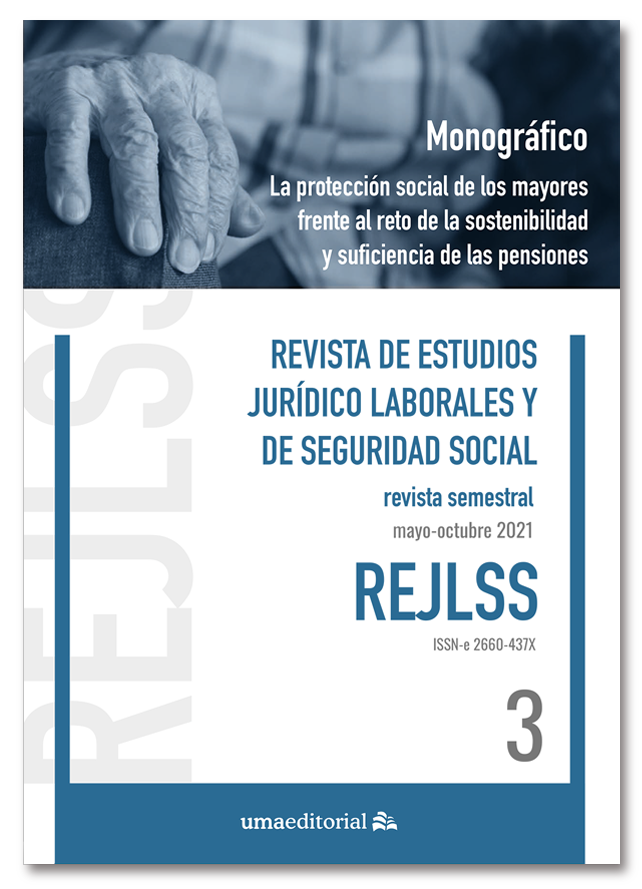The content and scope of care tasks in Residential Care Centers
Its consolidation after Judgment 1024/2020, of November 24, of the Social Chamber of the Supreme Court
DOI:
https://doi.org/10.24310/rejlss.vi3.13541Keywords:
Catalog of services, dependence, geroculturists, old people, residencesAbstract
Demographic and socio-sanitary changes are causing a progressive increase in older people who are increasingly long-lived, which leads to dependency problems in the last stages of their life. The assessment of each case and the recognition of the degree of dependence established in Law 39/2006, of December 14, on the Promotion of Personal Autonomy is essential for the geroculture staff to develop the exercise of their functions with quality, without leaving the one side the special mention that the Law makes to the training and qualification of professionals and caregivers. The controversy raises in article 17 of the VII State Collective Framework Agreement for Care Services for Dependent Persons, when the functions of the farmer are specified, and the possible incompatibility existing in the exercise of certain residential functions. However, jurisprudence endorses this attribution of functions, at the time through Sentence 1/2019, of January 21 of the National Court, and subsequently in Sentence 1024/2020, of November 24 where the Chamber of the Social of the Supreme Court gives firmness to article 17 of the Collective Agreement.
Downloads
Metrics
Publication Facts
Reviewer profiles N/A
Author statements
Indexed in
-
—
- Academic society
- N/A
- Publisher
- Universidad de Málaga. UMA Editorial
References
Bohórquez Rodríguez, A., Excelencia en servicios sociosanitarios. Decálogo ALBOR. Medicina geriatría. España. Mayo 2021. Disponible en https://alborconsultor.com/author/alfbohorquez/
Organización Internacional del Trabajo (OIT): Notas OIT sobre trabajo y familia se basan en la serie Work and family Information Sheets del Programa sobre las Condiciones de Trabajo y del Empleo (TRA VAIL). Traducción y adaptación al contexto de América Latina y el Caribe, realizada por el Programa Regional de Género y Trabajo Decente. Oficina Internacional del Trabajo,
Oficina Subregional para el Cono Sur, Oficina Subregional para Centroamérica, 2009.
Poyatos Chacón, F., Evaluación de la dependencia, mejora de la calidad. Vérticebooks. Málaga, 2012.
Rodríguez Rodríguez P., Bermejo García, L., Marín Carmona J.M., y Valdivieso Sánchez C., Servicios de ayuda a domicilio. Manual de planificación y formación. 3ª edición. Editorial médica Panamericana, Madrid 2011, págs. 99-129.
Trigueros Guardiola, I., y Mondragón Lasagabaster J., Manual de ayuda a domicilio. Formación teórica-práctica. Siglo XXI de España Editores, S.A., Madrid 2002, págs. 111-125.
Otras fuentes de referencia utilizadas:
Dependencia.info
Downloads
Published
How to Cite
Issue
Section
License
In the Revista de Estudios Juridico Laborales y de Seguridad Social (REJLSS) we are clearly committed to a policy of open access to scientific knowledge (See Berlin Declaration).
Those authors who have publications with this journal accept the following terms:
This journal provides immediate free access to its content under the principle of making research freely available to the public. All the contents published in the REJLSS are subject to the Creative Commons license
Attribution-NonCommercial-NoDerivatives 4.0 International (CC BY-NC-ND 4.0)
Copyrights are of two kinds: moral and patrimonial. Moral rights are perpetual, inalienable, non-transferable, inalienable, unattachable and imprescriptible prerogatives. In accordance with Spanish copyright legislation, the authors who publish in REJLSS retain the moral right over their work, as well as the ownership of the patrimonial right, which will be transferred to the University of Malaga for its dissemination in open access.
The patrimonial rights, refer to the benefits that are obtained by the use or disclosure of the works. REJLSS is published in open access and is exclusively authorized to perform or authorize by any means the use, distribution, dissemination, reproduction, adaptation, translation or transformation of the work.
It is the responsibility of the authors to obtain the necessary permissions of the images that are subject to copyright.
Authors whose contributions are accepted for publication in this journal retain the non-exclusive right to use their contributions for academic, research and educational purposes, including self-archiving or depositing in open access repositories of any kind.
The electronic edition of this magazine is edited by the Editorial of the University of Malaga (UmaEditorial), being necessary to cite the origin in any partial or total reproduction.
The authors may adopt other non-exclusive license agreements for the distribution of the version of the published work (eg: deposit it in an institutional telematic archive or publish it in a monographic volume) provided that the initial publication is indicated in this magazine.
Authors are allowed and recommended to disseminate their work through the Internet (eg, in institutional telematic archives or on their website) before and during the submission process, which can produce interesting exchanges and increase citations of the published work.







19.png)
